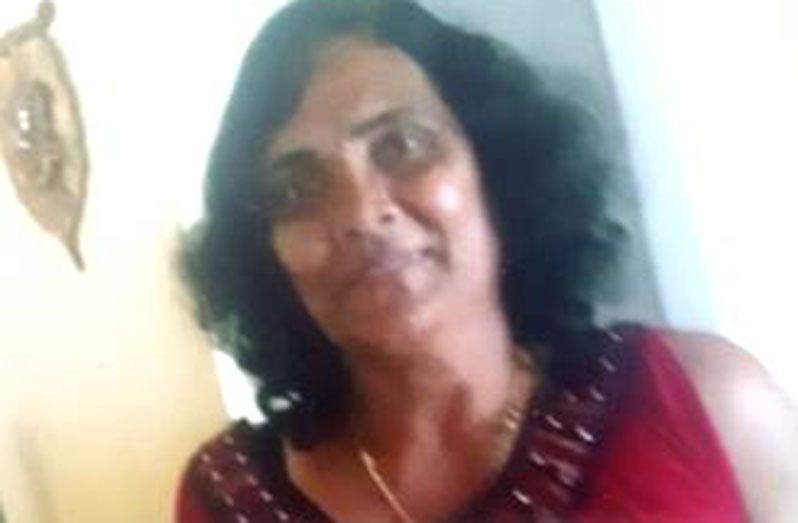…determined to keep fighting
BACK in 2017, it simply seemed like a hard boil that would eventually go away on its own. It was not paining or causing any trouble for 61-year-old Gometie Sawh of Thierens, Leguan Island. Thanks to a grand-daughter who went running to her mom to tell her about her grandmother’s complaint, Sawh was able to pursue help.
“Meh daughter come and look at the hard boil and said ‘Mommy, this is no hard boil,’” Sawh recalled in an interview with Pepperpot Magazine.
She knew nothing about breast cancer, so when her daughter told her of the possibility, she brushed it off and thought it was nothing of the sort. But then she decided to go to the hospital and get it checked out.
Doctors told her she needed to do a mammogram. “I book my name and from there I started going and the doctor start explaining to me all what was happening to me,” she reflected.

Sawh was eventually told that she had to get her right breast removed urgently before the cancer spread to other parts of her body. “I said ‘doc, I don’t know what it is; you know and you do what you have to do.’ So I do the surgery to take off the breast and everything finish quick, quick.”
Refusing to stress about the situation after she was told the dreadful news definitely helped Sawh to cope. “I laugh it out. If I was a person to take on, today I woulda be dead. I didn’t take it on at all. I know for myself if I stressed out, I wouldn’t be here today,” she expressed.
Going through chemotherapy was extremely difficult for her. “You have to be strong to do this. I did four double and four single at public hospital,” she expressed. To compound the situation, she had no relatives in Georgetown to stay at. “I had to beg people to stay because I didn’t have family in town and you have to reach for chemo at 6 am.”
After doing the surgery, though, she asked the doctor for a referral letter so that she could have gotten some of the services she needed right home in Leguan. But even so, she had to travel from Leguan several times a month to do blood work and other things before taking the chemotherapy.

This had a draining effect, especially as her husband had died a few years before and she had no financial support. She depended on what help her children and others on the island gave her. “It was very hard. My children and other people helped me with passage. People tell me they were sorry for me,” she reflected.
Having completed chemotherapy, Sawh said she couldn’t move on to the next step of doing radiation because she hadn’t the finances to do it. She asked the doctor if there was any other possible alternative to it and she started to receive two injections for 18 months.
Because of the pandemic, though, along with a death in her family, Sawh could not make it for all of the doses of injection. So she is still in the process of completing this treatment. She is also trying herbal remedies in her quest to become entirely cancer-free.
At the moment, she seems uninterested in pursuing radiation because she still doesn’t have the money and said she also would prefer to spare herself circumstances that are like her days of taking chemotherapy. She is advising other women to check out lumps promptly, irrespective of how small they are.
October has been designated Breast Cancer Awareness Month, and according to the World Health Organisation (WHO), treatment can be highly effective, especially when the disease is identified early. “Treatment of breast cancer often consists of a combination of surgical removal, radiation therapy and medication (hormonal therapy, chemotherapy and/or targeted biological therapy) to treat the microscopic cancer that has spread from the breast tumour through the blood. Such treatment, which can prevent cancer growth and spread, thereby saves lives,” the organisation said.
It said behavioural choices and related interventions that reduce the risk of breast cancer include prolonged breastfeeding; regular physical activity; weight control; avoidance of harmful use of alcohol; avoidance of exposure to tobacco smoke; avoidance of prolonged use of hormones; and avoidance of excessive radiation exposure.
According to WHO, symptoms of breast cancer generally include a breast lump or thickening; alteration in size, shape or appearance of a breast; dimpling, redness, pitting or other alteration in the skin; change in nipple appearance or alteration in the skin surrounding the nipple (areola); and/or abnormal nipple discharge.
In the past, according to WHO, all breast cancers were treated surgically by mastectomy (complete removal of the breast). When cancers are large, mastectomy may still be required. Today, the majority of breast cancers can be treated with a smaller procedure called a “lumpectomy” or partial mastectomy, in which only the tumour is removed from the breast. In these cases, radiation therapy to the breast is generally required to minimize the chances of recurrence in the breast.





.jpg)








